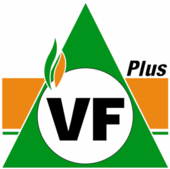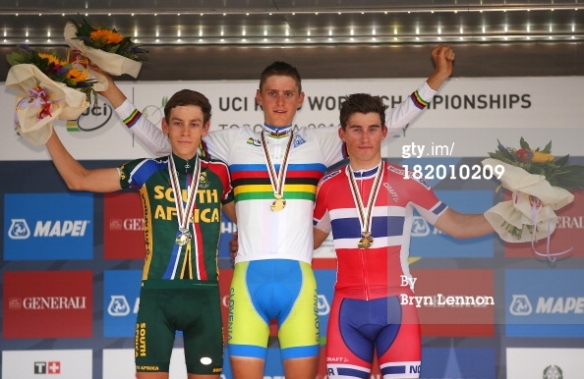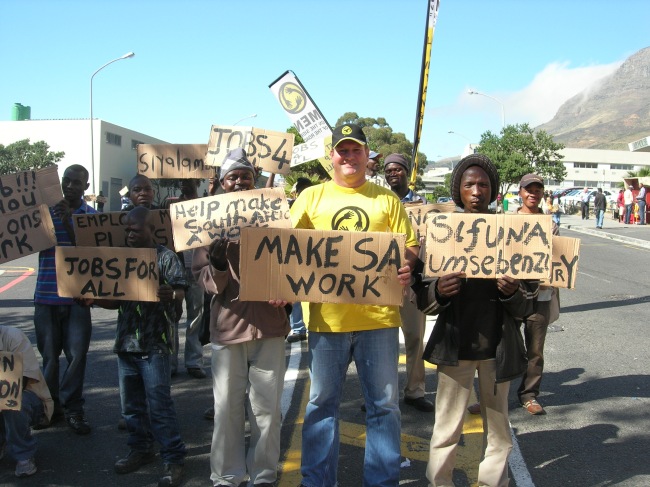
The Vryheidsfront(Freedom Front) is so far the main party representing the interests of the Boer-Afrikaners. Currently have 4 in 400 places in the South African National Assembly. It is the 5th largest party represented.
( Afrikaner Way )Explain us a bit what is your function and position in the Vryheidsfront party?
(Piet Uys) I am the Secretary General and manage the main office of the Party. We therefore receive and send most of the daily communication activities that are usually part of the management of a Political Party. We do a lot of coordination of projects. I am also the secretary of all our management meetings., and I am also part of the management of our finances.
(AF)What as been the evolution of the Vryeidsfront Party along the time and from which party it originated from?
(PU) The Freedom Front Plus was established in February 1994. It is the direct follower of the Afrikaner Volksfront which was active over the years 1993 -1994. This was not a political party, but a cultural movement which tried to form unity amongst the different Afrikaner Parties. The main reason for its existence was the fact that the Afrikaners realised that they will loose all forms of control over the government of South Africa and that the National Party of that time did not have any plans regarding the self-determination of the Afrikaner people. The Party was established because Genl. Constand Viljoen managed to obtain the agreement of the ANC that the self-determination will be addressed after the election of 1994. In order to participate in these elections a new political party had to be formed. The Party’s main campaign-propaganda was exactly that of the self-determination of the Afrikaner people. During the elections of 1994 the Party obtained 640 000 votes which gave the Party representation in various provincial legislatures and also in the national Parliament.
(AF) what are the major political objectives of the Vryheidsfront Party?
(PU) The major political objectives of FF Plus are to regain self-determination for the Afrikaner people. This is based on Section 235 of the Constitution which allows self-determination.
(AF)What is goal of the Vryheidsfront Party for the next legislative elections, what percentage of votes and how much deputies in the parliament you think it’s possible to get?
(PU)In the Election of 2013, the Party must at least double the representation in National Parliament ; that will bring us to at least 8 representatives. We must also regain representation in the Provinces of Gauteng, Freestate , Northern Cape and Mpumalanga . Because we 1have a proportional election system, our representation will also be influenced by many other factors, including the possibility of additional parties, which do not exist at the moment but who could appear on the horizon before April 2013.
(AF) What is your perspective of the crime scene in South Africa in the recent years. Do you think that there has been a increase over the last years?
(PU) The level of crime in this country is unacceptable. On top of that it seems as if the police do not have the capacity to manage statistics. If you visit the webpage of the SAPD you will however find a lot of statistics that will indicate that we have a crime-ridden society. It has never been this bad here before. During last week it became known that we have more than a thousand police officers serving in the SAPD that have a criminal record, of which murder is also part. There has definitely been an increase in crime of which the attacks on farms and the farmers are the most tragic.
(AF) Do you think that the today’s crimes against Afrikaners and other whites in South Africa are encouraged by members of political parties like Julius Malema(Now at EFF) or Jacob Zuma(ANC) among others with hatred speech or hatred songs like ‘’Kill the boer, kill the farmer’’
(PU)I will never say that any of the mentioned Parties actually encourage crimes against anybody. The black people in South Africa suffer just us much as the white people, and murders against the black people are proportionally more than that of white people. Unfortunately, it appears as if the police is not able to solve the crimes. Remember the hatred song “Kill the Boer, Kill the Farmer” has been banned and is not allowed to be used.
(AF) About the Volkstaat, we know that the Vryheidsfront Plus proposed for that a relatively remote area of the Northern Cape . What were the reasons for the Vryheidsfront Party choose that region and not the area of the Oranje Vry Staat or the Transvaal that probably represents better the history of the Boer-Afrikaner people.
(PU)The only reason why the Northern Cape was identified as a proposed Volkstaat is the fact that Afrikaners, if they resettle there, and do their own work instead of hiring black people, could physically form a majority.
(AF)The Vryheidsfront represents the Afrikaner people in UNPO(Unrepresented Nations and people organization) an international democratic organisation that facilitates the voices of peoples worldwide, The presence in this organization, has helped the Afrikaner people in their struggle for self-determination?
(AF)Our presence in this UNPO has brought our dilemma under the attention of many more people and institutions. It also helped to make our cause more acceptable in our country as well, as it improves the image and credibility of our arguments. It also costs us 2000 Euros a year.
(AF) Vryheidsfront have contacted with European organizations and parties? What is their perspective on Afrikaner self-determination of the people?
(PU)We have indeed contacted specific political parties in Europe . These Parties are very interested in the position of the Afrikaner people and are keen to learn more about our predicament. We would really like to invite representatives from most of these parties to South Africa , but financially it is not possible. These Parties has shown a great understanding of our situation; we think the reason for that is that the people in Europe have a lot of experience regarding minorities and how to solve their problems. These Parties are keen to learn and are also prepared to give advice as far as possible.
(AF) In your proposal of Volkstaat which kind of people are allowed, only Afrikaners, only whites or all the people from all the races that want to live there and respect the Afrikaner people and the Afrikaans language?
(PU)Our Party has always indicated that we need territory where we can form the majority. The main reason for this is that we insist on having Afrikaner schools and Afrikaner Universities; as the New South Africa continues to establish itself, Afrikaners will loose all the Afrikaans – universities and schools, due to the fact that we are a minority. Only the future will learn us how a proposed Volkstaat could be managed.
(AF) Having regard to the current political what situation you prefer for the boer-afrikaner people, a federalist solution that would grant some autonomy(like in Spain with Basques for example) or simple independence
(PU)I think that your question actually suggests a Federalist Solution to our problem. The important point is that, at the moment, we have nothing. We are governed by the ANC-Party. At the moment we have nothing and run the risk to be marginalised completely. My opinion is that if we gain some sort of independence or self-determination, it will be a unique model that perhaps do not exist anywhere in the world, at the moment.






